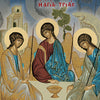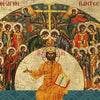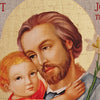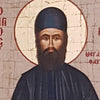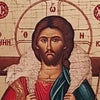Holy Spirit as a person of the Holy Trinity

“Who together with the Father and the Son is worshipped”
According to the Patristic Theology, the Ascension of Christ is inherently connected to the descent of the Holy Spirit. Evidently, the Comforter’s coming is an essential continuation of Christ’s work on earth, as a part of His divine plan for the salvation of humanitymn.
By taking the human nature, Christ does not just complete the divine plan of His Father, but also continues to act and to attract the unique human hypostases where He entered as a Forerunner.
He who was ascended and sat at the right hand of the Father and God becomes also a human partaker of the Holy Spirit’s mission. Christ’s human nature is in absolute community in the Trinity, in a way that cooperates with the Father in the work of the Holy Spirit. But the Holy Spirit as well, comes to the Church “with its own free will” as a God equal to the other two persons in the Holy Trinity. This fundamental sequence of the Ascension with the Pentecost, while declaring that the coming of the Holy Spirit is connected and inseparable from the work of Christ, at the same time constitutes an epiphany of the Holy Spirit. Indeed, the presence of the Holy Spirit on the day of Pentecost summarizes the economy of salvation, because in this way the mystery of the Holy Trinity as the mystery of Salvation is fully revealed.
Tongues of fire
The Holy Spirit descends as a Master and is revealed as a unique hypostasis in the form of tongues of fire. In fulfilling the divine plan of His Father, the incarnate Son appears as the very centre and purpose of the union of the whole world, created and uncreated, since the first moment of creation. This could not have happened without the presence and synergy of the Holy Spirit. Inseparable from the Son’s work, the Holy Spirit oversees the relationship of the God with the world and the people. Pentecost is not the first time that the Holy Spirit appears in history. From the creation of the world and the man to the incarnate Christ and the formation of the Church, the work of the Holy Spirit develops in stages.
The Man and the World were created with the Holy Spirit
The Holy Spirit is present during the manifestation of God’s creative energy and works in synergy with its lifegiving and perfect presence. If the God Father creates and blesses through his God Son, that happens always in the presence of the Holy Spirit. The whole creation comes to the state of being from that of not being. It is formed and is hold together from the presence of God, whereas grows and is being developed through the Holy Spirit. The angels’ wisdom, discipline and perfection are due to the energy of the Holy Spirit. The rest of the creation, reasonless as it is, awaits the man in order to connect and to get to know its Creator, as well as become a partaker in His Kingdom.
In the creation of man, whose complex nature connects the visible and invisible world, the reasonless creation also participates in the divine energy and life. The Son and Word of God himself creates the man in His image and likeness, offering an engagement for further developing and completing his divine living breath.
This lifegiving breath is the grace blessed by the Holy Spirit that is inserted in the core of the human existence, with its logic soul and earthly body.
Aware of this divine breath, the protoplast emerges as the only creature in whole creation that has a special and direct relationship with the Holy Trinity.
Man with his free will, depicts the Word of God and, including creation, is led by the grace of the Spirit that dwells in him, to the perfection of his relationship with God, to his complete and intangible assimilation with his divine archetype.
This dynamic relationship between God and creation which man officiates with the synergy of the Holy Spirit, is interrupted by the misguided decision of the first Adam.
The Holy Spirit in the Old Testament
The Old Testament narrates the gradual manifestation of God's plan for the salvation and recall of Man through the dramatic course of God's people in history.
The action of the Holy Spirit directs sometimes openly and sometimes secretly the adventure and path of the "people of God", acting on the unfolding of the mystery of the divine economy in creation and in history. All the righteous from Seth to the Virgin Mary, the paradoxical events that accompany and give meaning to the history of Israel, the provision of the Law and the 10 commandments, the divine promises, especially the prophecies and epiphanies of the yet to arrive Word, are excellent testimonies of the unceasing revelatory presence and action of the Holy Spirit.
The prophets, inspired by the Holy Spirit, proclaimed the future and mystical Christological event through their speech and paradoxical spectacles.
The Holy Spirit in the Conception and Birth of Jesus
The grace of the Holy Spirit becomes even more evident in the life and work of the last prophet and forerunner of Christ. Mostly, however, it is revealed to the Virgin Mary, whom he visits in order to prepare Her to serve the mystery of incarnation. The Theotokos, representing the human race, freely consents and accepts to serve God's plan. This can only be seen as an expression of the unique role of the Holy Spirit to illuminate and effortlessly direct the innermost parts of human existence to communion and encounter with the Word of God. The most characteristic aspect of the work of the Holy Spirit culminates in the face of Christ.
The Holy Spirit from the Baptism of Christ to his Crucifixion
The secret to Christ’s identity is revealed throughout His life through intense presence and action of the Holy Spirit. The presentation of Christ to the Temple, His recognition by Symeon, the meeting with the prophetess Anna, but mainly the baptism in the Jordan as a manifestation of his relationship with the Father and the Spirit, the repulsion of temptations in the desert, the teaching and miracles, are all predominantly events related to the Spirit.
Shortly before the passion of Christ the disciples receive a taste of the Kingdom during the transfiguration in Mt Tabor. The body of Jesus floods and radiates the glory and light of His divine nature, while the Spirit as a cloud of light coexists with him. It is due to the power of the Spirit the disciples can and do see with their transformed senses this glorious transformation of humanity.
All these events indicate the transformative and eschatological role of the Holy Spirit in the communion and participation of the saints in the Christological event, that is, in the formation of the Body of the Church and in the revelation of the mystery of the Kingdom.
In the event of the Cross, the Holy Spirit stands by Christ so that his body is not separated from the uncreated energies of the Spirit, due to Its hypostatic union with the Word. His equally divine soul descends enlightened and omnipotent to Hades, to give life to the souls of the dead of all centuries.
The Resurrection in spirit
The Resurrection of Christ is also spiritual, not because it is an independent work of the Holy Spirit from which the Father and the Son are absent, but because it is precisely the Spirit who is the par excellence transmitter of the common energy of the Trinity to the creation and the humanity. It is characteristic that the resurrected Christ renews the promise of the Father for the mission of the Holy Spirit and shortly before his ascension, he re-provides the spiritual lifegiving breath, inaugurating that primordial breath during the initial creation of the man.
After the completion of Christ's economy, when all that was necessary for the preparation of salvation was accomplished, a new period begins in the work of the Holy Spirit.
The descent of the Holy Spirit
The descent of the Holy Spirit on the day of Pentecost was the baptism and constituent event of the Church as a charismatic extension to the Christological sacrament in order to sympathize with the humanity. The constant presence of the Comforter makes the community of the Church an organism that lives and grows by the grace of Christ in creation and in history.
If the incarnation showed that Christ is Spirit-bearer, then the work of the Holy Spirit in the Church does not consist in the revelation of the uniqueness of His person, but in the eternal revelation of Christ. The Holy Spirit, although not incarnate, with his incorporeal presence and action activates the dynamic character of Christ's economy towards the rest of humanity. The descent of the Spirit during Pentecost became the beginning of an uninterrupted series of descents, which activate and transmit the unique event of Christ within the community of the Church. In the action and energy of the Holy Spirit are founded the sacraments of the Church, with which the integration of the unique human hypostases in the society and unity of the unique body of Christ takes place.
Baptism and the Eucharist are the ways in which the life of Christ, which is the life of the Spirit itself, is gifted to the members of his body.
In this way, Christ as the head of the body not only is not placed above or outside the Church, but constitutes as God-man its very existence.
The Church as a constant Pentecost is the community in which the variety of gifts is not opposed but functionally serve the unity and providence of the Body.
After all, the work of the Holy Spirit in the Church is always a work of unity with Christ at the centre.
The Body of Christ consists of one Spirit only if the communion of members towards this Body is preserved.
This reality is pointed out by St Athanasios the Great, saying, "and we who drink the Spirit, we drink Christ", because according to St Paul, Christ is the spiritual stone, the lifegiving water, the source of the Spirit towards humanity.
The work of the Comforter throughout the space and time is the adoption and union of the faithful with Christ, in His body, that is the Church.
The feast day of the Holy Spirit this year falls on Monday 21th June 2021

